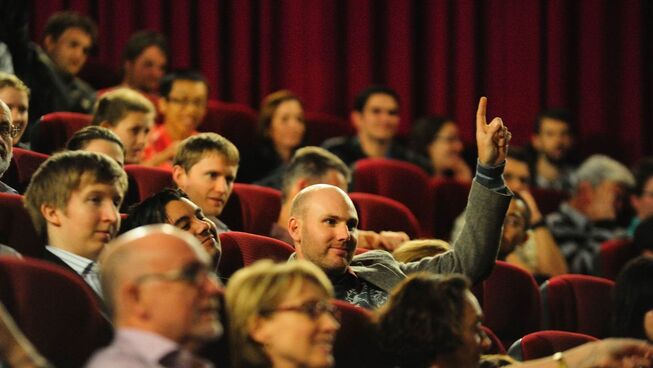Can atheists deal with death?

Before attending the Global Atheist Convention, I would have thought "Yes, surely atheists can face death". But after hearing Sam Harris, I'm not so sure.
Sam Harris is a well-known advocate of atheism, and one of the draw cards for the conference. Before he started speaking, Harris told us that, in honour of Christopher Hitchens, he had changed the topic of his talk, and that today he would be discussing Death.
Harris claimed he could deal with death, but my doubts came during question time. But first, let me tell you a bit of what he said.
Harris began by claiming that only atheists can deal with death. All the religions, he said, treated death as a problem: a problem they solved through speculative devices, such as an afterlife where we could be reunited with our departed loved ones. Atheists, being free of such superstitions, were free to see that life was the problem. They could focus on the business of living, unencumbered by religious baggage, and free to seek the betterment of the human condition.
Harris offered us some nuggets of wisdom. I particularly liked his insight that people spend much of their time either reliving the past or anticipating the future, rather than living in the moment. Remembering and anticipating are both activities we do 'now', and I think Harris is right to encourage us to be busy 'living' now.
But then things took an odd turn. Harris asked us to close our eyes as he taught us a meditation technique modelled on Buddhist reflections. The aim was to teach us to be aware of our senses and living 'now', without any 'interpretive frame'. I kept my eyes open during this 10 minute exercise, and looking around I saw that I wasn't the only person whose 'interpretive frame' was bemused skepticism. One woman tweeted "I teach this stuff to my Year 7 drama class". Indeed.
But it was during question time that Harris' claims about dealing with death came undone.
A young woman asked how she could talk to people who were grieving. She said that having become an atheist, she was now more sensitive to people's suffering. But how could she engage with people who were grieving?
Referring to the hypothetical case of a person dealing with the loss of a child, Harris' advice was that meditative techniques such as the one he had just demonstrated were useful in coping with grief! He suggested that in times of grief it was important to find sources of happiness – he seemed to be saying we could escape from grief by living in the 'now' where we are neither remembering the person nor anticipating life without them.
I was dumbfounded that this intelligent, urbane, articulate man had nothing to offer a grieving parent except a temporary anaesthetic. A Panadol for a brain tumour.
I know something of the pain of a grieving parent, having lost one of my god-daughters in a traffic accident two years ago. Grief is a complex and difficult process, which needs to be embraced – not avoided. Indeed, the depth of our grief reflects the value we attach of the relationship. If we persist in avoiding grief, that is to some degree a denial of the relationship we had with the dead person.
Harris had stated in his address that atheism is seen by some as an attack on grief, in that it undermines the 'false hopes' of religion. But if I've understood him correctly, Harris is not attacking but rather avoiding or denying grief.
Harris is a clever man, but I feel that Jesus offers greater wisdom in matters of life and death.
With regard to living in the present, Jesus says: “Do not worry, saying, ‘What shall we eat?’ or ‘What shall we drink?’ or ‘What shall we wear?’ For the pagans run after all these things, and your heavenly Father knows that you need them. But seek first his kingdom and his righteousness, and all these things will be given to you as well. Therefore do not worry about tomorrow, for tomorrow will worry about itself. Each day has enough trouble of its own.” (Matthew, chapter 6, verses 31-34)
This confident embracing of the moment which Jesus commands is not a superstition: it has two historical reference points. The first is the resurrection of Jesus – an event that shows God's favour towards us, and which shows us what our own resurrection will be like. The second is the future resurrection which Jesus promises to all those who put their lives in his hands.
I doubt Harris can deal with death, but I'm confident the resurrected Jesus has dealt with death for me.

